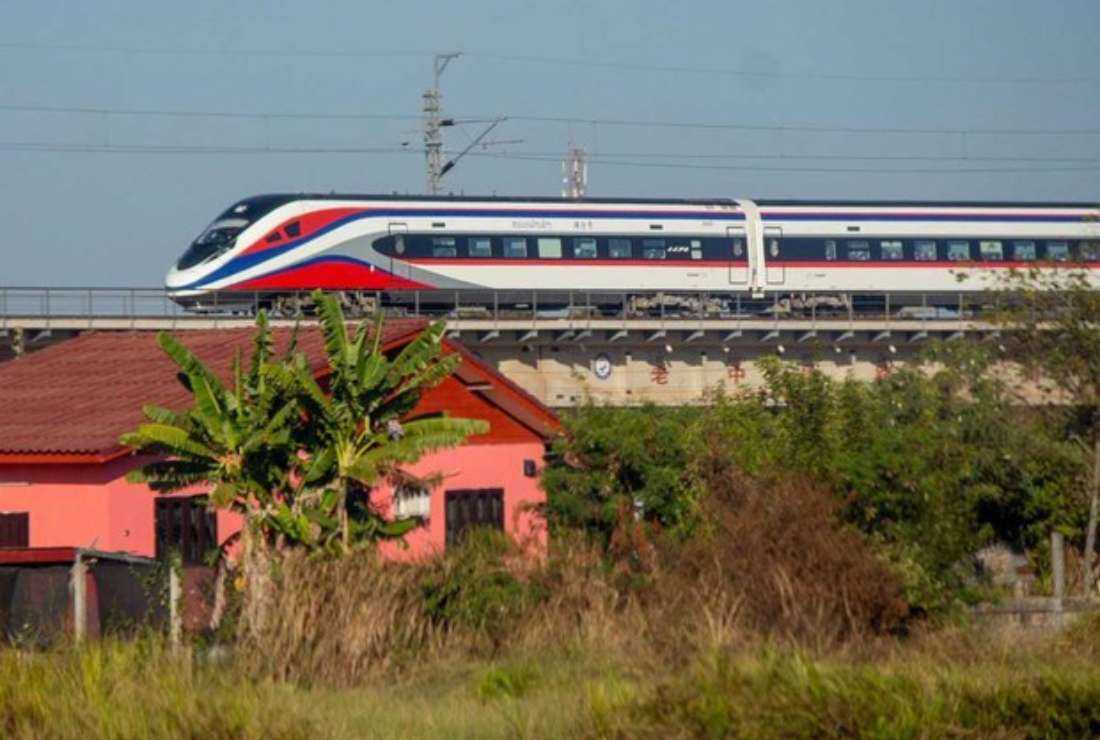
A train passes through villages and fields on Dec. 3, 2021, in Xaythani district, Vientiane, Laos. (Photo: RFA)
Dozens of Lao families displaced due to a cross-country railway project have rejected the new houses given to them citing the lack of fertile farmlands nearby for agriculture and the distance from the city.
The authorities are pushing the families to relocate to the houses allotted to them, but they are hesitant due to the placement of the houses, Radio Free Asia (RFA) reported on Nov. 9.
“The new place is… too far away from the city, markets, and schools,” an unnamed resident living in Luang Namtha said.
“It’s too far. There is no land to farm. It’s just a house in which we can sleep. We can’t do anything else,” the resident added.
The residents were displaced due to the US$6 billion Laos-China high-speed railway project spanning around 410 kilometers from the Lao-China border to the Lao capital, Vientiane.
The project opened in December 2021, and the World Bank estimated that it would boost tourism, freight transport, and trade in agriculture in the region.
Khamphanh Phommathat, chair of the Lao-China Railway Company said they had built two resettlement villages for 242 families in Luang Namtha and Oudomxay provinces but only 130 families have moved in so far.
“A new resettlement village in Luang Namtha Province has a total of 159 houses, 65 of which have been occupied; the remaining 94 have not,” Phommathat said.
“A new resettlement village in Oudomxay Province has a total of 83 houses, 65 of which have been occupied, the remaining 18 have not,” Phommathat added.
Phommathat claimed all 107 houses in a resettlement village in Luang Prabang province were occupied.
A second unnamed resident told RFA that some of the residents who refused to move into the new houses in the resettlement village were trying to sell them.
“Some people from other areas have been in the process of buying these homes,” the resident said.
“Some of the families have already sold their new homes and they want to buy new homes and new pieces of land somewhere near the city instead,” the second unnamed resident added.
Residents are not moving in
An unnamed Lao government official who is a mediator between the government and the affected villagers said that only a small number of families have moved into the new village in Luang Namtha province.
“About 11 families are moving in soon, but for various reasons, the majority of them are not ready to move in yet,” the official said.
“The authorities will keep pushing them to move into all the 159 homes,” the official added.
Another official from the Na Mor district pointed out that a “majority of families have not occupied their new homes,” in Na Teuy district in Luang Namtha province.
Another unnamed homeowner in Na Mor resettlement village in Oudomxay province pointed out that around 18 families have not moved into the area.
Compensation insufficient
In a statement, Viengthavisone Thephachanh, the chair of the State Audit Organization in Laos said that “most of the compensation has been paid to the people who were affected and displaced.”
The railway company is meant to pay a total of 1,844 billion Laotian Kip (around US$88.8 million) to all the affected villagers. So far, about 1,552 billion Laotian Kip has been paid to 6,073 families and about 695 families have not yet been paid.
In August, some of the homeowners in the affected areas had voiced their dissatisfaction with the compensation offered by the government, RFA reported.
Reportedly, the villagers were offered 80,000 Laotian Kip per meter, but they were asking for 150,000 Laotian Kip per meter.
Government officials had said in August that there were about 6,855 families nationwide affected by rail line construction in four provinces, with 5,837 families already receiving compensation, RFA reported.


